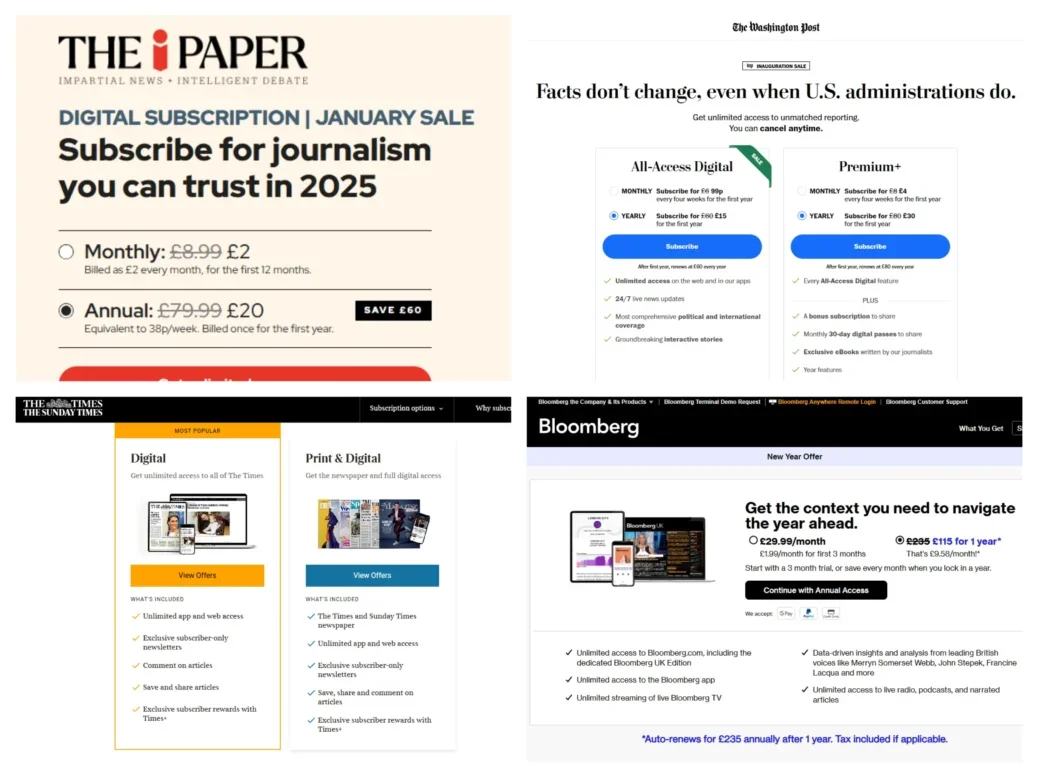
The price of digital news subscriptions in the UK have remained fairly stable over the last year as prices charged for print newspapers have skyrocketed, Press Gazette analysis reveals.
Of the 21 major news websites included both this year and last year in our research, 11 kept their annual subscription charges the same and two others changed only slightly, possibly due to currency fluctuations.
The annual rate of ‘newsflation’ for digital content stands at 3% according to our research (broadly inline with the official UK inflation rate which stands at 2.5%). By contrast, newsstand cover prices for the UK’s national newspapers have risen 12% in the past year and 135.8% in the past decade.
Where applicable, we took the most comparable standard digital subscription prices rather than premium packages with extra components. We also used publishers’ full-priced packages rather than any discounts or trial periods (scroll down for more on these).
Two titles reduced their digital subscription prices compared to January 2024: The Spectator, now under new ownership with Sir Paul Marshall, dropped its price by a quarter from £131.99 to £99.99 and Bloomberg’s price was down by a fifth or £64 to £235 for the year.
Among only traditional UK national newspaper brands (the Financial Times, The Telegraph, The Times, Mail+, The i Paper) only The i Paper raised its annual price in the past year (from £69.99 to £79.99).
The biggest increase in price was the Belfast Telegraph's £20, or 40%, rise to £69.99.
If we left your news outlet off our list and you feel they should be included, please get in touch with charlotte.tobitt@pressgazette.co.uk and we will add if appropriate.
Digital news subscriptions: Monthly costs and trial offers
Twelve publications also kept their monthly prices the same while three dropped the cost to the consumer: The Telegraph by as much as £10, down from £24.99. The Spectator (down £2 to £11) and The Economist (down £1.65 per month to £18.25) also cut their prices.
The most expensive news subscription to UK consumers was again the Financial Times, costing £369 per year or £39 per month for a standard package.
The cheapest on an annual basis were The Washington Post and The New European (both £60), while The Atlantic (£5.40, converted from USD) was the cheapest monthly subscription.
An increasing number of news publishers are focusing on reader revenue and asking their most loyal and engaged users to put their hands in their pockets amid a tough advertising market and falling social media and search referrals.
Bloomberg editor-in-chief John Micklethwait described paywalls as "the safest way to guarantee journalistic jobs" in a speech last month.
The Mail appears in Press Gazette's table of prices (see below) twice to account for its Mail+ Editions subscription, which was in our ranking in previous years, and the Mail Online partial paywall known as Mail+ which launched one year ago and now has more than 100,000 paying subscribers.
Mail Online's then editor and publisher, now chief executive, Danny Groom told Press Gazette last year that Mail+ can coexist with the site's massive free readership but that it was harnessing its "huge loyal, direct audience".
To subscribe to every outlet in our list at full annual price (excluding Mail+ and The Week for which we did not save 2024 prices last year) would cost £3,005.62 - marginally down 0.27% in a year from £3,013.82.
Most of the news publishers had a trial price or offer available but Press Gazette compared full-price costs for our main analysis.
The Financial Times is currently offering 24% off its annual price (£279 for a year instead of £369) while Bloomberg has a deal for £115 for a year instead of £235 (51% off) and The Economist has a New Year deal of £109.50 instead of £219 (50% off).
Email pged@pressgazette.co.uk to point out mistakes, provide story tips or send in a letter for publication on our "Letters Page" blog

